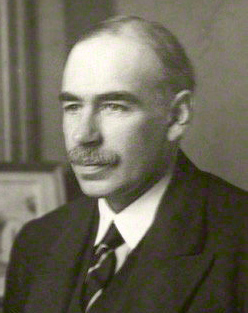John Maynard Keynes nejznámější citáty
1925 o omezené dostupnosti antikoncepce, nedostatku sexuální výchovy, zákonech o manželství a rozvodu,…
Originál: (en) …in all these matters the existing state of the law and of orthodoxy is still medieval – altogether out of touch with civilised opinion and civilised practices.
Zdroj: [Seven things you may not know about John Maynard Keynes, theguardian.com, 2015-03-05, 2015-10-30, http://www.theguardian.com/books/2015/mar/05/seven-things-john-maynard-keynes]
John Maynard Keynes: Citáty anglicky
“Ideas shape the course of history.”
As quoted in The Peter Plan: A Proposal for Survival (1976) by Laurence J. Peter, p. 97
Attributed
“The avoidance of taxes is the only intellectual pursuit that still carries any reward.”
As quoted in A Dictionary of Scientific Quotations (1977) by Alan L. MacKay, p. 140
Attributed
Zdroj: The Economic Consequences of the Peace
Zdroj: Essays In Biography (1933), Alfred Marshall, p. 188
"A Short View of Russia" (1925); Originally three essays for the Nation and Athenaeum, later published separately as A Short View of Russia (1925), then edited down for publication in Essays in Persuasion (1931)
Ref: en.wikiquote.org - John Maynard Keynes / Quotes / Essays in Persuasion (1931)
Essays in Persuasion (1931), A Short View of Russia (1925)
Letter to Roy Harrod (4 July 1938), in The Collected Writings of John Maynard Keynes, Vol. XIV (1971), p. 297
Essays in Persuasion (1931), Social Consequences of Changes in The Value of Money (1923)
Zdroj: The Economic Consequences of the Peace (1919), Chapter IV, Section I, p. 77
“We will not have any more crashes in our time.”
Conversation with Felix Somary in 1927, reported in Felix Somary, The Raven of Zurich, London: C. Hurst, 1986 (1960), 146-7
Attributed
Zdroj: How to Pay for the War (1940), Ch. 5 : A Plan for Deferred Pay, Family, Allowances and a Cheap Ration
“Logic, like lyrical poetry, is no employment for the middle-aged”
Zdroj: Essays In Biography (1933), F. P. Ramsey, p. 296
Originally published in The Economic Journal, March 1930. and The New Statesman and Nation, October 3, 1931
Essays in Persuasion (1931), Economic Possibilities for our Grandchildren (1930)
Zdroj: How to Pay for the War (1940), Ch. 1 : The Character of the Problem
Zdroj: How to Pay for the War (1940), Ch. 2 : The Character of the Solution
Zdroj: How to Pay for the War (1940), Ch. 5 : A Plan for Deferred Pay, Family, Allowances and a Cheap Ration
On Isaac Newton
Essays In Biography (1933), Newton, the Man
First Annual Report of the Arts Council (1945-1946)
Zdroj: The Economic Consequences of the Peace (1919), Chapter III, p. 33
Zdroj: The Economic Consequences of the Peace (1919), Chapter II, Section III, p. 21
Zdroj: Essays in Persuasion (1931), The End of Laissez-faire (1926), Ch. 1
National self-sufficiency (1933) http://www.panarchy.org/keynes/national.1933.html Section 3, republished in Collected Writings Vol. 11 (1982).
“I work for a Government I despise for ends I think criminal.”
Letter to Duncan Grant (15 December 1917)
Zdroj: The Economic Consequences of the Peace (1919), Chapter VI, p. 250
“The atomic hypothesis which had worked so splendidly in Physics breaks down in Psychics.”
"Francis Ysidro Edgeworth", p. 286; Originally published in The Economic Journal, March 1926
Ref: en.wikiquote.org - John Maynard Keynes / Quotes / Essays In Biography (1933)
Essays In Biography (1933), Francis Ysidro Edgeworth
